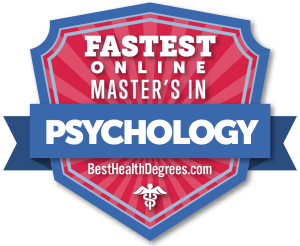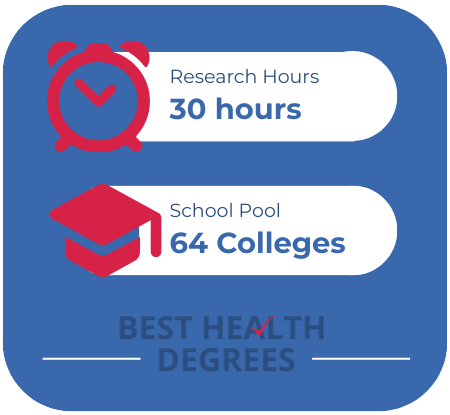Key Takeaways:
- USC and Pepperdine University are two top schools with accelerated master’s degrees in psychology. They offer completion times of 16 and 18 months respectively.
- Accelerated psychology programs are ideal for working professionals, allowing completion in less time than traditional degrees.
- These fast-track psychology programs are ranked based on cost, accreditation, reputation, and salary potential.
- All psychology programs listed have regional accreditation, ensuring eligibility for federal student aid.
Psychology is one of those rare disciplines that lends itself well to online studies and makes earning an advanced degree easier while you continue to work. While a Master of Arts or Master of Science in the field won’t always qualify you for licensure, accelerated psychology master’s programs can put you in a great position to work in a variety of fields.
Our Top 10 Accelerated Online Psychology Master’s Programs are:
| School Name | In-State Graduate Tuition | Completion Time | |
| 1. USC | $63,468 | 16 months | |
| 2. Pepperdine University | $39,100 | 18 months | |
| 3. Ball State University | $9,636 | 18 months | |
| 4. Grand Canyon University | $10,655 | 24 months | |
| 5. California Baptist University | $13,680 | 24 months | |
| 6. Liberty University | $7,893 | 18 months | |
| 7. Regent University | $16,028 | 24 months | |
| 8. SNHU | $18,900 | 24 months | |
| 9. Divine Mercy University | $24,405 | 16 months | |
| 10. Northcentral University | $16,794 | 18 months |
Methodology 10 Fastest Online Psychology Master’s Degree Programs
To rank the 10 Fastest Psychology Master’s Programs, Best Degrees analysts researched accurate data on accredited, trusted programs of all kinds. From our initial pool, we ranked programs according to price, accreditation, reputation, and salary potential, using data from IPEDS and Niche, U.S. News and World Report, and other higher education rating publications.
Each program on this ranking has regional accreditation so students can receive federal student assistance. Be sure to apply for aid by completing the Free Application for Federal Student Aid FAFSA®. Graduate degree students might qualify for loans and some schools require the FAFSA on file for departmental scholarships or stipends.
Our editors first ranked accredited accelerated online psychology master’s programs in October 2022. This ranking was updated February 2024.
1. University of Southern California
Offered through the USCOnline division of the University of Southern California, this online Master of Science in Applied Psychology is for working professionals. It’s possible to complete this graduate program in a rapid 16 months.
This master’s degree curriculum covers topics from research, theory, and organizational practice. Required classes include:
- Consumer Psychology
- Organizational Psychology
- Proseminar in Human Behavior: Applications, and Research Methods in Applied Psychology
- Proseminar in Human Behavior: Foundations
You’ll have elective options in Psychology of Employee Selection and Assessment, Cross-cultural Psychology in Applied Settings, and more. Additionally, a practicum experience in your community is possible with the approval of the program director.
Admission requires an application, academic transcripts showing the completion of an accredited bachelor’s degree, a personal statement, three recommendation letters, and a resumé.
Pros
- The Princeton Review named USC as one of its Best 386 Schools
- Low student-to-faculty ratio of 9:1
- Research institution with prestige and top 10 rankings
Cons
- Higher tuition cost than some other programs
2. Pepperdine University
Within 18 months of full-time enrollment, you can earn a MA in Psychology from California’s prestigious Pepperdine University.
During the 36-48 credit hours of study, you’ll take five foundational courses, nine core classes, and two electives. Some courses in the curriculum are Interpersonal Skills and Group Therapy, Social Psychology, Theories of Counseling and Psychotherapy, Research and Evaluation Methods for Mental Health Professionals, Industrial-Organizational Psychology, Trauma in Diverse Populations, Introduction to Positive Psychology, and more. Classes are taught by faculty who work as clinicians or as other experts.
To start your online degree, you’ll complete an application and provide official academic transcripts demonstrating an awarded bachelor’s degree from an accredited school. You’ll also submit two letters of recommendation and a 2-5 page Statement of Purpose which describes your reasons for applying, prior experience and training, as well as your professional goals. The admission requirements for the online program are the same as for campus-based students.
Pros
- Top 50 rankings with U.S. News and World Report
- No GRE score required
- Large alumni network
- Low student-to-faculty ratio of 13:1
Cons
- Higher tuition cost than some other programs
- Cost of living higher than other areas
3. Ball State University
Located in Indiana, Ball State University awards a MA in Educational Psychology as well as an MS in Quantitive Psychology. These online programs take 18 months to complete.
Let’s look at the 30-credit hour MA in Educational Psychology first. This psychology degree offers specialties in Human Development, Gifted and Talented, Applied Behavior Analysis, Neuropsychology, and a customizable specialty. Core courses include Advanced Educational Psychology, Psychology of Human Development, Tests and Measurements, and more. The master’s degree in Quantitative Psychology requires 33-credit hours, which includes a thesis. Cores studies includes classes in Analysis of Variance, Applied Regression Analysis, Research Design, as well as Theory of Measurement. You’ll choose one of two concentrations in Quantitative or Mixed Methods.
Admission requires you hold a conferred bachelor’s degree, a 3.0 GPA, letter of intent and professional goals, a resume/CV, and three letters of recommendation. You’ll also need to provide academic transcripts.
Pros
- Four specializations and customizable options
- No GRE required for admission
- Summer terms available
Cons
- Not affiliated with a school psychologist license
4. Grand Canyon University
If you’re looking for an online Master’s in General Psychology which doesn’t require a thesis, this program at Grand Canyon University may be for you. The psychology degree requires 36 credit hours but the school has a generous transfer policy that allows you to transfer up to 12 credit hours.
Psychology students enroll in core courses in Contemporary and Ethical Issues in Psychology, Psychopathology, Human Development, Social and Cultural Psychology, Learning, Cognition, and Motivation, Health Psychology, Research Methods, as well as a Capstone Project. The Capstone Project allows you the opportunity to use the studies you’ve completed to identify and present research topics, as well as develop a roadmap for your goals. While not APA accredited, this program was designed using the psychology organization’s standards.
Grand Canyon University has made the graduate admission process quick and easy. You’ll complete an application and submit academic transcripts.
Pros
- Classes start every eight weeks
- Three semesters offered year round
- Capstone project with research opportunities
Cons
- Heavy Christianity focus
5. California Baptist University
CBUOnline offers a hybrid/online Master’s in Clinical Psychology that takes 24 months to complete. If your goal is to be a marriage and family therapist or clinical counselor, CBU is a great opportunity! Psychology students will require an additional six credit hours to meet Licensed Professional Clinical Counselor (LPCC) academic standards required by the California Board of Behavioral Sciences (BBS) in the state of California.
This psychology degree curriculum requires prerequisite studies in General Psychology or Lifespan Development. Core classes include topics in Diversity Issues in Counseling Psychology Seminar, Marriage and Family Therapy Theory, Human Sexuality, Advanced Research Methodology, Advanced Psychopathology, Family Therapy, Professional Ethics and Law, and more. You’ll also complete two virtual practica and a comprehensive exam, which is based on a case you encounter during your practicum. The comprehensive exam portion will call for you to write a formal case report.
For admission, you need a conferred bachelor’s degree and a 2.75 GPA. You’ll also provide a 500-word personal statement and official academic transcripts from any college or university attended.
Pros
- Classes start every eight weeks
- Coursework requirements for licensure as a Marriage and Family Therapist (MFT) in the state of California
- Unique course offerings
Cons
- Distinctly Christian worldview some students may find limiting
- Higher student-to-faculty ratio of 18:1
6. Liberty University
This Virginia, Christian university has an online MA in Psychology with an Applied Psychology concentration you can finish in 18 months on average. If you have graduate hours to transfer, Liberty can accept up to 50% of the 36-credit hour degree total.
You’ll take courses in Organizational Psychology, Foundations in I/O Psychology, Industrial Psychology, Special Topics in I/O Psychology, Psychology of Performance, Personnel Psychology, Candidacy Exam, as well as an Applied Organizational Practicum. You’ll need a prerequisite in statistics and research methods for the majority of the course offerings. All study is 100% online and is offered in 8-week course schedules. This graduate psychology program emphasizes theory and application.
The LU graduate application is required for admission, along with a Transcript Request Form (if applicable). The admission process can begin with unofficial transcripts. You may also be asked to provide professional recommendations, a Statement of Purpose, and other documents. There is no GRE requirement.
Pros
- Generous transfer credit policy of up to 50%
- No GRE requirement
- Offers a concentration in applied psychology
Cons
- Higher student-to-faculty ratio of 18:1
- Large student body of over 96,000 students
7. Regent University
Regent University gives you a choice of six concentrations in this online, 39-credit hour MS in Psychology degree. You can pick a specialty area in Addictions, Cyberpsychology, Organizational Psych, Marriage and Family, Leadership Coaching, or Doctoral Preparation. Regardless of your concentration, you’re expected to take core courses in Social Psychology, Life Span Psychology, Affect, and Cognition. You also study Statistics and Research Methods in Psychology.
You’ll complete an application and provide a copy of your government-issued ID (driver’s license, military ID, etc.), an admissions questionnaire, and provide a copy of your unofficial academic transcript. Regent has a generous transfer policy.
Pros
- Eight week course selections
- Many concentrations to help specialize your degree
- Doctoral preparation concentration offered
Cons
- Higher student-to-faculty ratio of 21:1
8. Southern New Hampshire University
SNHU has long been known for its online programs. The school offers an MS in Psychology three concentrations. You can choose from Child and Adolescent Development Psychology, Forensic Psychology, or Industrial Organizational Psych. Be aware that this psychology degree program will not lead to licensure.
You’ll complete foundation or core courses regardless of your concentration. Among those classes are Foundations of Psychology, Foundations in Statistics, and Foundations in Research Methods. You’ll also study 24 credit hours in Social Psychology, Measurement and Assessment, Ethical Practice in Psychology, Cognitive Processes, Theories of Personality, and Capstone in Psychology. If you prefer not to choose a concentration, you can take 12 credit hours in electives from different areas like Global Terrorism, Critical Issues in the Criminal Justice System, Women in Leadership.
There are no GRE/GMAT test scores required for application. Admission requires academic transcripts from previous schools attended and a Graduate Attestation Form, which will ask for your GPA and degree conferral date.
Pros
- No GRE or GMAT scores required
- No set class meetings
- Three specialized concentrations
Cons
- Lower number of transfer credits accepted (up to 12 credits)
9. Divine Mercy University
Established in 1999 by psychologists and educators who wanted to combine the study of psychology with Catholic-Christian teachings of “…the human person” and values and morals, Divine Mercy University offers a fully, online MS in Psychology. The degree program consists of 33 credits and is a non-licensure program.
There are six concentration areas that help students tailor their degree toward an area of interest. These include Marriage and Family Studies, Leadership, Bioethics, and Human Services Counseling. You can also earn a Pre-PhD concentration or a Self-Designed one. Core classes include Human Growth and Development Across the Lifespan, Cognition and Affect Across the Lifespan, and Human Growth and Development Across the Lifespan. You’ll take an additional three courses in your chosen concentration.
You’re required to have a baccalaureate degree with at least a 2.5 GPA, letters of recommendation, a written statement, and a resumé for admission.
Pros
- Multiple areas of concentration
- Pre-PhD pathway
- Self-designed concentration for students with unique career goals
- Small student population
- No GRE required for admission
Cons
- Non-licensure program
- Less diverse course offerings
10. Northcentral University
Northcentral University offers a MA in Psychology degree you can complete in 30 credit hours. The program has two concentrations in Gender and Sexual Fluidity or General Psych. It’s estimated that you can earn this degree in just 18 months.
Classes start every Monday at Northcentral and the school has a robust catalog of classes related to your degree and concentration. Among the classes offered are Statistics, Test and Measurements, Key Theories and Concepts in Sexuality and Gender Studies, Theories of Personality, Program Evaluation and Monitoring in Psychology, Psychology of Aging. This program doesn’t lead to licensure.
To be considered for admission, you’ll begin with an application and submit academic transcripts. Once reviewed, an Enrollment Advisor will determine your eligibility for admission and calculate transfer hours.
Pros
- No residency requirements
- Specializations in Gender and Sexual Fluidity
- No GRE required for admission
- Transfer credits accepted from accredited schools
Cons
- Non-licensure program
Frequently Asked Questions
• Lower cost: Accelerated programs take less time to complete and are offered at a lower tuition cost.
• Time savings: Less than two years is the average time spent earning an accelerated master’s in psychology degree.
• Work-life balance: Better manage your time with family, work, and school.
The average time it takes to get an accelerated master’s in psychology is 20 months. Most traditional master’s in psychology programs take two years, on average. To help shorten the time it takes to get your degree, you can transfer credits from accredited schools. Some programs accept 12 or more credits toward your degree.
It is! According to the Bureau of Labor Statistics, 6% job growth for psychologists should result through 2032. This means about 12,800 job openings for psychologists will occur each year, on average, for the next 10 years. Growth for this field is double the rate (3%) for all other occupations.
The Bureau of Labor Statistics reports the average pay for psychologists is $85,330/year. The lowest 10% of psychologists make $48,010/year, while the highest 10% make $141,910/year. To earn the highest wages, you can specialize in a high-paying psychology field, such as industrial-organizational psychology. This field pays $139,280/year, on average.
A degree from an accredited college or university is respected by employers. Accreditation assures employers (and graduate schools) that your program met all criteria for quality and adhered to recognized educational standards.
A 3.5 or better on a 4.0 scale is a good average GPA. Some programs, especially those ranked among the top research schools in the country, look at candidates with high GPAs. This means a 3.6 or 3.7 GPA will be considered competitive.
If you want to become a psychologist or counselor, a graduate degree in psychology can help. You can qualify for licensing and become a psychologist in different fields like:
• Child psychology
• Industrial-organizational psychology
• Marriage and family counseling
• School psychology
Related Articles:


